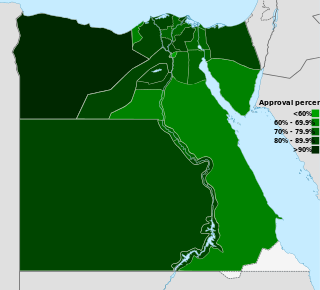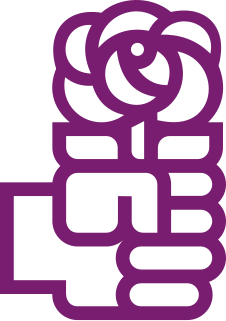
The Constitution of the Republic of Lithuania defines the legal foundation for all laws passed in the Republic of Lithuania. It was approved in a referendum on 25 October 1992.

A referendum on the treaty establishing a Constitution for Europe was held in Spain on 20 February 2005. The consultative referendum on ratification of the proposed Constitution of the European Union was approved by 81.8% of voters, although turnout was just 41.8%, the lowest since the end of the Franco era.
A four-part referendum was held in Ukraine on 16 April 2000. The referendum was called by President Leonid Kuchma, and asked voters whether they approved of four amendments to the constitution that would increase the powers of the President and introduce an upper chamber.
Parliamentary elections were held in Albania on 3 July 2005. The result was a victory for the opposition Democratic Party (PD) and its allies, prominently the Republican Party (PR). Former president Sali Berisha became prime minister as a result of the election. Voter turnout was only 48.0%.

Parliamentary elections were held in Macedonia on 18 October 1998, with a second round on 1 November. VMRO-DPMNE emerged as the largest party, winning 49 of the 120 seats, and later formed a coalition government with Democratic Alternative and the Democratic Party of Albanians.

A seven-question referendum was held in Belarus on 24 November 1996. Four questions were put forward by President Alexander Lukashenko on changing the date of the country's independence day, amending the constitution, changing laws on the sale of land and the abolition of the death penalty. The Supreme Council put forward three questions on constitutional amendments by the Communist and Agrarian factions, local elections and the national finances.
A referendum on a proposed draft of the new Serbian constitution was held on October 28 and 29 October 2006 and resulted in the draft constitution being approved by the Serbian electorate. The constitution is Serbia's first as an independent state since the Kingdom of Serbia's 1903 constitution. Over 6.6 million people were entitled to vote in the national referendum.
A constitutional referendum was held in Greece on 15 November 1968. Voters were asked whether they wished to ratify a new constitution prepared by the dictatorial regime. It was approved by 92.1% of voters, with a voter turnout of 77.7%.

A constitutional referendum was held in France on 5 May 1946. Voters were asked whether they approved of a new draft Constitution proposed by the Constituent Assembly elected in 1945.
A constitutional referendum was held in Denmark on 23 May 1939. Voters were asked whether they approved of a new constitution. Although it was approved by 91.9% of those who voted, a turnout of only 48.9% meant that the percentage of eligible voters approving it was only 44.46%, below the 45% required by the existing constitution of 1915.
Parliamentary elections were held in Albania on 24 June 2001. The result was a victory for the ruling Socialist Party of Albania, which won 73 of the 140 seats, resulting in Ilir Meta remaining Prime Minister. Voter turnout was 53.6%.
Constitutional Assembly elections were held in Bulgaria on 10 June 1990, with a second round for eighteen seats on 17 June. They were the first elections held since the fall of Communism the previous winter, and the first free national elections since 1931. The elections were held to elect the 7th Grand National Assembly, tasked with adopting a new (democratic) constitution. The new electoral system was changed from 400 single-member constituencies used during the Communist era to a split system whereby half were elected in single member constituencies and half by proportional representation. The result was a victory for the Bulgarian Socialist Party, the freshly renamed Communist Party, which won 211 of the 400 seats. Voter turnout was 90.3%.

A double referendum was held in Italy on 11 June 1978. Voters were asked whether they approved of the repealing of laws on political party financing and public order. Both proposals were rejected.

A constitutional referendum was held in Egypt on 19 March 2011, following the 2011 Egyptian revolution. More than 14 million (77%) were in favour, while around 4 million (23%) opposed the changes; 41% of 45 million eligible voters turned out to vote.
A constitutional referendum was held in Albania on 7 November 1994. Voters were asked whether they approved of the new constitution published on 6 October, which would have given more power to the country's President. However, it was rejected by voters, with just 43.6% in favour. Voter turnout was 84.4%.

A constitutional referendum was held in Andorra on 14 March 1993. Drafted by the Co-Princes and the General Council, the new constitution was approved by 74.2% of voters, with a 76% turnout. The first elections under the new constitution were held later in the year.

Constitutional Assembly elections were held in Latvia on 17 and 18 April 1920. The Latvian Social Democratic Workers' Party emerged as the largest party, winning 57 of the 150 seats. The elections were boycotted by communist parties. The Constitutional Assembly was responsible for drafting a constitution, which was approved on 15 February and promulgated on 7 November 1922.

A constitutional referendum was held in East Germany on 6 April 1968. The new constitution was approved by 96.4% of voters, with turnout reported to be 98.1%, and came into force on 9 April.

A referendum on the electoral system was held in Slovenia on 8 December 1996. Voters were given three options to approve or not; a compensatory system, a two-round majority system and a proportional representation system at a national level. Due to the low turnout of 37.9%, none of the proposals crossed the legal threshold and the results were invalidated. However, in 1998 the results were revisited by the Constitutional Court, who found that the two round majority system had been approved.

A consultative constitutional referendum was held in Moldova on 23 May 1999. It was initiated by President Petru Lucinschi and asked voters whether they approved of changing the system of government to a presidential system. The proposal was approved by 64.2% of voters. However, the Party of Communists of the Republic of Moldova and the Alliance for Democracy and Reforms opposed Lucinschi, and were able to vote several constitutional changes through parliament on 5 July 2000. The changes reduced the powers of the president and strengthened the parliament and government.

















